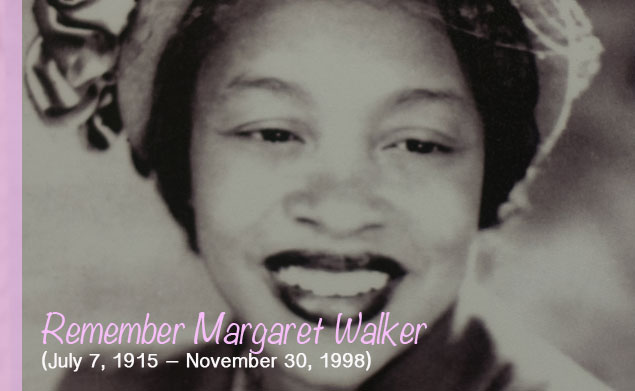
Born Margaret Abigail Walker Alexander on July 7th, 1915, Margret Walker has been a major contributor to African American literature and is often referred to as one of the most gifted Black intellectuals in America. A poet and novelist, Walker used her work as a way to connect with and advocate for ordinary Black Americans.
In her poem My People, for which was the first African American to win the Yale Younger Poets award, Margaret Walker provided a voice for ‘her people’- those “singing their slave songs repeatedly”, “playmates in the clay and dust and sand of Alabama,” standing staring trying to fashion a better way from confusion, from hypocrisy and misunderstanding” and all of ‘her people’ trying to make a better life of themselves and gain understanding in this world. She closed the posem by declaring:
‘Let a new earth rise. Let another world be born. Let a
bloody peace be written in the sky. Let a second
generation full of courage issue forth; let a people
loving freedom come to growth. Let a beauty full of
healing and a strength of final clenching be the pulsing
in our spirits and our blood. Let the martial songs be
written, let the dirges disappear. Let a race of men now
rise and take control.’
The relatable nature and inclusiveness of her poem not only enable her to reach and connect with African Americans from all walks of life but it also advocated for their plight and provided as a voice for them. In addition to her inspirations poems, Margaret Walker was also known for her novel Jubilee. Released in 1966, the novel was based on her own grandmother’s life as a slave and has received critical acclaim. Still in print, the novel has been translated into 7 different languages and is considered an important piece of American literature.
While breast cancer would claim her life on November 30th, 1998, Margaret Walker has paved the way for African American literary scholars and her work has earned a place among the best (African) American poets. Inducted into the African American Literary Hall of Fame on October 17th, 1998, Margaret Walker’s voice and work continues to inspire many. When asked how she viewed her work, she responded, “The body of my work . . . springs from my interest in a historical point of view that is central to the development of black people as we approach the twenty-first century.”
According to breastcancer.org, for women in the U.S., breast cancer death rates are higher than those for any other cancer, besides lung cancer. Breast cancer does not discriminate against age, sex, race or economic status. It affects people from all walks of life. Let the story and legacy of Margaret Walker serve not only as an inspiration but also as a reminder that breast cancer is a disease that touches everyone, even some of our most celebrated legends.
Latest posts by Nekita (see all)
- Before Rihanna there was Grace Jones - December 27, 2014
- Marimba: Expression of Freedom, yet my Afro-Ecuadorians… - December 25, 2014
- Who Makes Claim to Being the Reggae Capital of the World? - December 24, 2014



